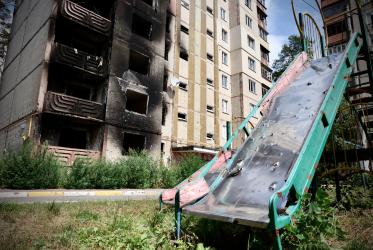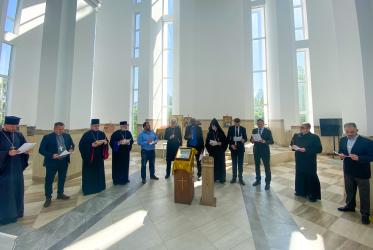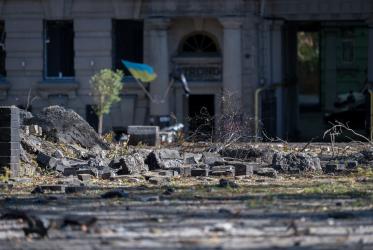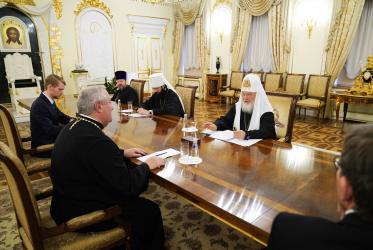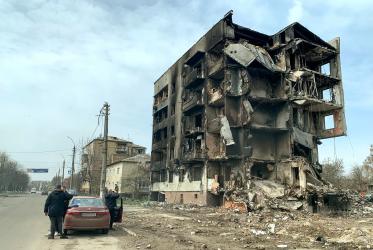Attending the meeting that took place at the Patriarchal Residence in St Daniel’s Monastery in Moscow, were also Metropolitan Anthony of Volokolamsk, chairman of the Moscow Patriarchate’s Department for External Church Relations; Archimandrite Philaret (Bulekov), DECR vice-chairman; Fr Mikhail Gundyaev, representative of the Moscow Patriarchate to the World Council of Churches and international organisations in Geneva; Hieromonk Stefan (Igumnov), DECR secretary for inter-Christian relations; and Rev. Prof. Dr Benjamin Simon, Program Executive for Church Relations of the WCC.
Patriarch Kirill welcomed the guests saying: “I appreciate that you have come to Russia in these hard times to meet with me and my people and talk about the difficult international relations we live in and are confronted with today which naturally affects our inter-church relations, as well.”
He continued with a recollection of his experience with the important conciliatory role WCC played in 70’s when he was the Moscow Patriarchate representative to the WCC (1971-1974) in dealing with the international conflicts which troubled inter-church relations at that time. “I remember the great political crises of that time that caused serious troubles for the inter-Christian relations in the WCC and that challenged even the WCC existence; yet, the WCC would always find a way out and help the Churches engage in the process of peace-making.”
The current difficult situation in the world takes its toll on inter-church relations, the patriarch noted and mentioned that the COVID-19 pandemic with its wide range of problems was an aggravating factor affecting the life of people and Churches likewise. “I appreciate that in these trying times the World Council of Churches is up to the tasks and challenges facing it,” he added.
He also expressed his high appreciation for the World Council of Churches 11th Assembly of the held in Karlsruhe, Germany, on August 31 – September 8 and expressed satisfaction that the Churches acted as Churches and resisted to the pressure to expel the Russian Orthodox Church from the WCC.
“We all are going through difficult, I would say, critical times because of the new geopolitical configuration and world conflicts, in particular the one concerning Ukraine”. He continued saying that most of the people in the world today have discovered the problems in the Ukrainian conflict only now while they started in 2014: “Eight years ago there were first Ukrainian shellings of Donbass. Destroyed houses, heavy casualties – that’s the reality. More than 2 million refugees from that area found refuge in Russia. Personally, I wrote three letters during those years to the political and religious authorities of the world, including WCC, and asked to intervene that the problems be solved through dialogue and mediation and to avoid killings and destructions. I had no concrete answers and such requests were met with total silence. Yet, my hope was and still is that as Churches we have to go beyond the logic and interest of the politicians and look for just peace”.
Then, the Patriarch made the following statement on the difficult situation in Donbass and elsewhere: “It is a matter of overriding importance that no more blood be shed, no more buildings and infrastructure be destroyed, and no more people suffer. Therefore, we are greatly interested in drawing our ecumenical partners’ unbiased attention to this difficult and tragic situation and convince the world leaders to bring peace through negotiation and dialogue rather through shedding of blood and destruction."
He mentioned the visit that the delegation of the World Council of Churches and ACT Alliance undertook to the Dioceses of Rostov-on-Don and Shakhty in May to learn more about the relief efforts of the Russian Orthodox Church. “I hope that tomorrow you will visit our humanitarian aid headquarters. It operates in Moscow; yet the core aspect of its work is providing actual support to the people affected by the conflict,” the Patriarch continued.
“But there are many private, parochial, youth initiatives. Unofficially, even without the support from higher church authorities, people go there to render assistance and share their resources with those in need”.
Fr. Ioan Sauca, the WCC acting general secretary, thanked the Primate of the Russian Orthodox Church for the meeting and said: “The members of our fellowship are looking with great interest and hope to this visit. We came here with a mandate from the Central Committee. This June, when we were preparing for the Assembly, I was asked to visit our member Churches with bleeding wounds from Middle East: Syria, Lebanon, Israel and Palestine and then from Ukraine, and now we have come to Russia. You are aware of the concerns that member Churches of the WCC have with regard to the war between Russia and Ukraine and of our statements that condemn the war and violence which we made in our governing bodies – the statements which were elaborated with the participation of delegates from the Russian Orthodox Church. I am also grateful for our correspondence, for your response to our letters. The reason for coming here is to see what we can do together to build bridges of peace and reconciliation and stop the bloodshed and the danger of nuclear conflagration.”
Then he continued: “I am aware of the letters which you sent from 2014 to 2020 to the leaders of the world, drawing their attention to the situation and asking for dialogue. The problem is that people forgot about it or never knew about it. I think it would very helpful now to make the same statement, saying clearly to the world what you told us, here, today: stop the bloodshed, stop the killing, stop the destruction of infrastructure, look for peace and reconciliation. This will help greatly the world and the Orthodox Church as well and will make it clear what is your personal position to the war."
Fr Sauca also made reference to the appeals that had come from a number of the WCC member Churches asking to expel the Russian Orthodox Church. “When such a proposal was brought for vote, all Central Committee members, in unanimity, voted to keep the Russian Orthodox Church in the fellowship of WCC but to continue the dialogue in particular on the theological argumentation and support of the war which, for some people, were made public in some of Your sermons and speeches”. As Patriarch Kirill seemed not to be aware what we speak about, the members of the Russian delegation in the meeting explained that some people just quote certain phrases from Patriarch Kirill’s homilies, failing to give full quotations from his speeches and put them in context and thus using them to engineer accusations against the Primate of the Russian Orthodox Church.
Consequently, Fr Sauca said that he thought it was important to clarify such serious concern for WCC members, and Orthodox included. He expressed his belief that it would be beneficial for inter-church relations today if His Holiness Patriarch Kirill could offer his insight into the topic, dwelling, in particular, on what may be regarded as a holy war from the theological point of view, what reasons there might be for people to get involved in hostilities, what is the theological significance of self-sacrifice in the war and what is the meaning of “metaphysical war” that Patriarch Kirill used in relation to the war in Ukraine.
Evidently surprised, the patriarch has answered: ”My theological position to the war? I do not think that any Church or Christian can have a supporting position to wars and killings. As Churches, we are called to be peacemakers and to defend and protect life. War cannot be holy. But when one has to defend himself and his life or to give his life for the lives of the others things look different. We have so many examples in our Christian history. Yet, as peacemakers we have to make all efforts to bring peace through dialogue and avoid any conflict or violence. This is my view.
Metaphysical war has nothing to do with physical killings or with the conflict in Ukraine. It is a reference to a quotation from Saint Paul (Ephesians 6,12) which says that our fight is not against flesh and blood but against the dark powers and authorities of the world which confront the values of the Gospel. And such powers are everywhere present not only in the West. My view is that our call and vocation is to witness and defend peacefully but boldly the values of the Gospel which model our lives”.
In conclusion, the WCC acting general secretary added, “We value the Russian Orthodox Church. It is one of the biggest Churches of the WCC. And all of us would like to see that the Russian Orthodox Church continue to be a part of it because your contribution over the years was very important for the ecumenical movement and also for the Orthodox unity.” He noted that the WCC can be a very good platform for dialogue between Orthodox Christians as well.
His Holiness Patriarch Kirill thanked the guest for emphasizing a significant role of Orthodoxy in inter-Christian movement and recalled his participation in WCC Assemblies since 1968, when he was at the age of 21 and pointed to the concrete contributions brought in the WCC debates by Orthodox theologians in general and from the Russian Orthodox Church.
Such examples demonstrate that there were different moments in the history of the Russian Orthodox Church’s participation in the work of the WCC, and at times serious difficulties had to be overcome.
"The times we live in today are very difficult; yet these difficulties do not come from the Churches, but from the political context, and this context constitutes an extreme danger today. Therefore, the Churches today must not add fuel to the fire. On the contrary, we must do everything within our power to put out the fire. In this regard, the World Council of Churches has a very important function. In my opinion, the WCC today has taken the only proper position – active, but neutral – taking no political sides in this conflict. The Churches by nature have a peace-making potential. And if a Church starts waving a flag of war and calling for confrontation, it acts against its nature.”
“In my view, the international crisis unfolding today is dangerous, but no more so than many other crises we went through in the past. The Churches have experience in going through the crises together. I believe that through dialogue, in brotherhood and cooperation we should exert positive influence on the political situation,” His Holiness Patriarch Kirill of Moscow and All Russia said, “May God help that the Christian Churches which cooperated with each other in past, may today as well continue to bear their joint witness before the world, resisting the temptation to become a part of some political force.”
